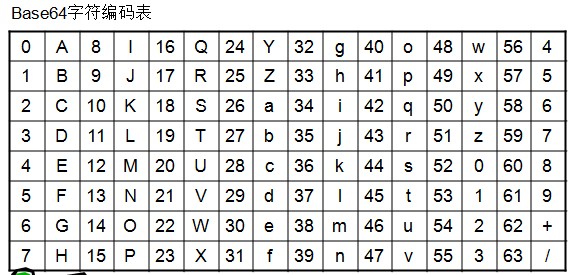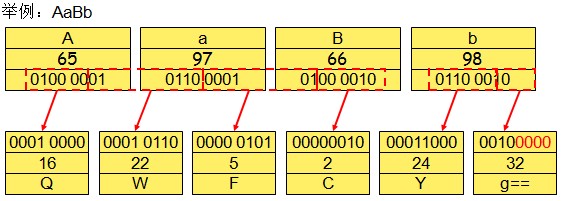Base64用途
1. 用于对 SOHO 级路由器(网关设备)管理员帐户密码的加密
2. 流媒体网站对于播放的流媒体文件的路径的加密
3. 迅雷等下载软件对下载链接地址的加密
Base64算法

Base64编码要求把3个8位字节(3*8=24)转化为4个6位的字节(4*6=24),之后在6位的前面补两个0,形成8位一个字节的形式。

Base64类
函数:
unsigned intCreateMatchingEncodingBuffer (unsigned intp_InputByteCount,char**p_ppEncodingBuffer);
创建匹配于编码的缓存空间。参数:1输入字节数,2进行编码需要的缓存空间;返回值:缓存空间大小。
unsigned intCreateMatchingDecodingBuffer (char*p_pInputBufferString,char**p_ppDecodingBuffer);
创建匹配于解码的缓存空间。参数:1解码对象缓存,2进行解码需要的缓存空间;返回值:缓存空间大小。
voidEncodeBuffer (char*p_pInputBuffer,unsigned intp_InputBufferLength,char*p_pOutputBufferString);
进行编码。参数:1明文,2明文长度,3密文输出。
unsigned int DecodeBuffer (char*p_pInputBufferString,char*p_pOutputBuffer);
进行解码。参数:1密文,2明文;返回值:明文长度
C++实现:
- /************************************************
- * *
- * CBase64.h *
- * Base 64 de- and encoding class *
- * *
- * ============================================ *
- * *
- * This class was written on 28.05.2003 *
- * by Jan Raddatz [[email protected]] *
- * *
- * ============================================ *
- * *
- * Copyright (c) by Jan Raddatz *
- * This class was published @ codeguru.com *
- * 28.05.2003 *
- * *
- ************************************************/
- #pragma once
- #include <afx.h>
- #include <stdlib.h>
- #include <math.h>
- #include <memory.h>
- const static unsigned int MAX_LINE_LENGTH = 76;
- const static char BASE64_ALPHABET [64] =
- {
- 'A', 'B', 'C', 'D', 'E', 'F', 'G', 'H', 'I', 'J', // 0 - 9
- 'K', 'L', 'M', 'N', 'O', 'P', 'Q', 'R', 'S', 'T', // 10 - 19
- 'U', 'V', 'W', 'X', 'Y', 'Z', 'a', 'b', 'c', 'd', // 20 - 29
- 'e', 'f', 'g', 'h', 'i', 'j', 'k', 'l', 'm', 'n', // 30 - 39
- 'o', 'p', 'q', 'r', 's', 't', 'u', 'v', 'w', 'x', // 40 - 49
- 'y', 'z', '0', '1', '2', '3', '4', '5', '6', '7', // 50 - 59
- '8', '9', '+', '/' // 60 - 63
- };
- const static char BASE64_DEALPHABET [128] =
- {
- 0, 0, 0, 0, 0, 0, 0, 0, 0, 0, // 0 - 9
- 0, 0, 0, 0, 0, 0, 0, 0, 0, 0, // 10 - 19
- 0, 0, 0, 0, 0, 0, 0, 0, 0, 0, // 20 - 29
- 0, 0, 0, 0, 0, 0, 0, 0, 0, 0, // 30 - 39
- 0, 0, 0, 62, 0, 0, 0, 63, 52, 53, // 40 - 49
- 54, 55, 56, 57, 58, 59, 60, 61, 0, 0, // 50 - 59
- 0, 61, 0, 0, 0, 0, 1, 2, 3, 4, // 60 - 69
- 5, 6, 7, 8, 9, 10, 11, 12, 13, 14, // 70 - 79
- 15, 16, 17, 18, 19, 20, 21, 22, 23, 24, // 80 - 89
- 25, 0, 0, 0, 0, 0, 0, 26, 27, 28, // 90 - 99
- 29, 30, 31, 32, 33, 34, 35, 36, 37, 38, // 100 - 109
- 39, 40, 41, 42, 43, 44, 45, 46, 47, 48, // 110 - 119
- 49, 50, 51, 0, 0, 0, 0, 0 // 120 - 127
- };
- enum
- {
- UNABLE_TO_OPEN_INPUT_FILE,
- UNABLE_TO_OPEN_OUTPUT_FILE,
- UNABLE_TO_CREATE_OUTPUTBUFFER
- };
- class CBase64
- {
- public:
- CBase64 ();
- unsigned int CalculateRecquiredEncodeOutputBufferSize (unsigned int p_InputByteCount);
- unsigned int CalculateRecquiredDecodeOutputBufferSize (char* p_pInputBufferString);
- void EncodeByteTriple (char* p_pInputBuffer, unsigned int InputCharacters, char* p_pOutputBuffer);
- unsigned int DecodeByteQuartet (char* p_pInputBuffer, char* p_pOutputBuffer);
- void EncodeBuffer (char* p_pInputBuffer, unsigned int p_InputBufferLength, char*p_pOutputBufferString);
- unsigned int DecodeBuffer (char* p_pInputBufferString, char* p_pOutputBuffer);
- unsigned int CreateMatchingEncodingBuffer (unsigned int p_InputByteCount, char** p_ppEncodingBuffer);
- unsigned int CreateMatchingDecodingBuffer (char* p_pInputBufferString, char** p_ppDecodingBuffer);
- unsigned int EncodeFile (char* p_pSourceFileName, char* p_pEncodedFileName);
- unsigned int DecodeFile (char* p_pSourceFileName, char* p_pDecodedFileName);
- };
- /************************************************
- * *
- * CBase64.cpp *
- * Base 64 de- and encoding class *
- * *
- * ============================================ *
- * *
- * This class was written on 28.05.2003 *
- * by Jan Raddatz [[email protected]] *
- * *
- * ============================================ *
- * *
- * Copyright (c) by Jan Raddatz *
- * This class was published @ codeguru.com *
- * 28.05.2003 *
- * *
- ************************************************/
- #include "stdafx.h"
- #include "CBase64.h"
- CBase64::CBase64 ()
- {
- }
- unsigned int CBase64::CalculateRecquiredEncodeOutputBufferSize (unsigned int p_InputByteCount)
- {
- div_t result = div (p_InputByteCount, 3);
- unsigned int RecquiredBytes = 0;
- if (result.rem == 0)
- {
- // Number of encoded characters
- RecquiredBytes = result.quot * 4;
- // CRLF -> "\r\n" each 76 characters
- result = div (RecquiredBytes, 76);
- RecquiredBytes += result.quot * 2;
- // Terminating null for the Encoded String
- RecquiredBytes += 1;
- return RecquiredBytes;
- }
- else
- {
- // Number of encoded characters
- RecquiredBytes = result.quot * 4 + 4;
- // CRLF -> "\r\n" each 76 characters
- result = div (RecquiredBytes, 76);
- RecquiredBytes += result.quot * 2;
- // Terminating null for the Encoded String
- RecquiredBytes += 1;
- return RecquiredBytes;
- }
- }
- unsigned int CBase64::CalculateRecquiredDecodeOutputBufferSize (char* p_pInputBufferString)
- {
- unsigned int BufferLength = strlen (p_pInputBufferString);
- div_t result = div (BufferLength, 4);
- if (p_pInputBufferString [BufferLength - 1] != '=')
- {
- return result.quot * 3;
- }
- else
- {
- if (p_pInputBufferString [BufferLength - 2] == '=')
- {
- return result.quot * 3 - 2;
- }
- else
- {
- return result.quot * 3 - 1;
- }
- }
- }
- void CBase64::EncodeByteTriple (char* p_pInputBuffer, unsigned int InputCharacters, char* p_pOutputBuffer)
- {
- unsigned int mask = 0xfc000000;
- unsigned int buffer = 0;
- char* temp = (char*) &buffer;
- temp [3] = p_pInputBuffer [0];
- if (InputCharacters > 1)
- temp [2] = p_pInputBuffer [1];
- if (InputCharacters > 2)
- temp [1] = p_pInputBuffer [2];
- switch (InputCharacters)
- {
- case 3:
- {
- p_pOutputBuffer [0] = BASE64_ALPHABET [(buffer & mask) >> 26];
- buffer = buffer << 6;
- p_pOutputBuffer [1] = BASE64_ALPHABET [(buffer & mask) >> 26];
- buffer = buffer << 6;
- p_pOutputBuffer [2] = BASE64_ALPHABET [(buffer & mask) >> 26];
- buffer = buffer << 6;
- p_pOutputBuffer [3] = BASE64_ALPHABET [(buffer & mask) >> 26];
- break;
- }
- case 2:
- {
- p_pOutputBuffer [0] = BASE64_ALPHABET [(buffer & mask) >> 26];
- buffer = buffer << 6;
- p_pOutputBuffer [1] = BASE64_ALPHABET [(buffer & mask) >> 26];
- buffer = buffer << 6;
- p_pOutputBuffer [2] = BASE64_ALPHABET [(buffer & mask) >> 26];
- p_pOutputBuffer [3] = '=';
- break;
- }
- case 1:
- {
- p_pOutputBuffer [0] = BASE64_ALPHABET [(buffer & mask) >> 26];
- buffer = buffer << 6;
- p_pOutputBuffer [1] = BASE64_ALPHABET [(buffer & mask) >> 26];
- p_pOutputBuffer [2] = '=';
- p_pOutputBuffer [3] = '=';
- break;
- }
- }
- }
- unsigned int CBase64::DecodeByteQuartet (char* p_pInputBuffer, char* p_pOutputBuffer)
- {
- unsigned int buffer = 0;
- if (p_pInputBuffer[3] == '=')
- {
- if (p_pInputBuffer[2] == '=')
- {
- buffer = (buffer | BASE64_DEALPHABET [p_pInputBuffer[0]]) << 6;
- buffer = (buffer | BASE64_DEALPHABET [p_pInputBuffer[1]]) << 6;
- buffer = buffer << 14;
- char* temp = (char*) &buffer;
- p_pOutputBuffer [0] = temp [3];
- return 1;
- }
- else
- {
- buffer = (buffer | BASE64_DEALPHABET [p_pInputBuffer[0]]) << 6;
- buffer = (buffer | BASE64_DEALPHABET [p_pInputBuffer[1]]) << 6;
- buffer = (buffer | BASE64_DEALPHABET [p_pInputBuffer[2]]) << 6;
- buffer = buffer << 8;
- char* temp = (char*) &buffer;
- p_pOutputBuffer [0] = temp [3];
- p_pOutputBuffer [1] = temp [2];
- return 2;
- }
- }
- else
- {
- buffer = (buffer | BASE64_DEALPHABET [p_pInputBuffer[0]]) << 6;
- buffer = (buffer | BASE64_DEALPHABET [p_pInputBuffer[1]]) << 6;
- buffer = (buffer | BASE64_DEALPHABET [p_pInputBuffer[2]]) << 6;
- buffer = (buffer | BASE64_DEALPHABET [p_pInputBuffer[3]]) << 6;
- buffer = buffer << 2;
- char* temp = (char*) &buffer;
- p_pOutputBuffer [0] = temp [3];
- p_pOutputBuffer [1] = temp [2];
- p_pOutputBuffer [2] = temp [1];
- return 3;
- }
- return -1;
- }
- void CBase64::EncodeBuffer(char* p_pInputBuffer, unsigned int p_InputBufferLength, char* p_pOutputBufferString)
- {
- unsigned int FinishedByteQuartetsPerLine = 0;
- unsigned int InputBufferIndex = 0;
- unsigned int OutputBufferIndex = 0;
- memset (p_pOutputBufferString, 0, CalculateRecquiredEncodeOutputBufferSize (p_InputBufferLength));
- while (InputBufferIndex < p_InputBufferLength)
- {
- if (p_InputBufferLength - InputBufferIndex <= 2)
- {
- FinishedByteQuartetsPerLine ++;
- EncodeByteTriple (p_pInputBuffer + InputBufferIndex, p_InputBufferLength - InputBufferIndex, p_pOutputBufferString + OutputBufferIndex);
- break;
- }
- else
- {
- FinishedByteQuartetsPerLine++;
- EncodeByteTriple (p_pInputBuffer + InputBufferIndex, 3, p_pOutputBufferString + OutputBufferIndex);
- InputBufferIndex += 3;
- OutputBufferIndex += 4;
- }
- if (FinishedByteQuartetsPerLine == 19)
- {
- p_pOutputBufferString [OutputBufferIndex ] = '\r';
- p_pOutputBufferString [OutputBufferIndex+1] = '\n';
- p_pOutputBufferString += 2;
- FinishedByteQuartetsPerLine = 0;
- }
- }
- }
- unsigned int CBase64::DecodeBuffer (char* p_pInputBufferString, char* p_pOutputBuffer)
- {
- unsigned int InputBufferIndex = 0;
- unsigned int OutputBufferIndex = 0;
- unsigned int InputBufferLength = strlen (p_pInputBufferString);
- char ByteQuartet [4];
- while (InputBufferIndex < InputBufferLength)
- {
- for (int i = 0; i < 4; i++)
- {
- ByteQuartet [i] = p_pInputBufferString [InputBufferIndex];
- // Ignore all characters except the ones in BASE64_ALPHABET
- if ((ByteQuartet [i] >= 48 && ByteQuartet [i] <= 57) ||
- (ByteQuartet [i] >= 65 && ByteQuartet [i] <= 90) ||
- (ByteQuartet [i] >= 97 && ByteQuartet [i] <= 122) ||
- ByteQuartet [i] == '+' || ByteQuartet [i] == '/' || ByteQuartet [i] == '=')
- {
- }
- else
- {
- // Invalid character
- i--;
- }
- InputBufferIndex++;
- }
- OutputBufferIndex += DecodeByteQuartet (ByteQuartet, p_pOutputBuffer + OutputBufferIndex);
- }
- // OutputBufferIndex gives us the next position of the next decoded character
- // inside our output buffer and thus represents the number of decoded characters
- // in our buffer.
- return OutputBufferIndex;
- }
- unsigned int CBase64::CreateMatchingEncodingBuffer (unsigned int p_InputByteCount, char** p_ppEncodingBuffer)
- {
- unsigned int Size = CalculateRecquiredEncodeOutputBufferSize (p_InputByteCount);
- (*p_ppEncodingBuffer) = (char*) malloc (Size);
- memset (*p_ppEncodingBuffer, 0, Size);
- return Size;
- }
- unsigned int CBase64::CreateMatchingDecodingBuffer (char* p_pInputBufferString, char** p_ppDecodingBuffer)
- {
- unsigned int Size = CalculateRecquiredDecodeOutputBufferSize (p_pInputBufferString);
- (*p_ppDecodingBuffer) = (char*) malloc (Size+1);
- memset (*p_ppDecodingBuffer, 0, Size+1);
- return Size+1;
- }
- unsigned int CBase64::EncodeFile (char* p_pSourceFileName, char* p_pEncodedFileName)
- {
- CFile InputFile;
- CFile OutputFile;
- if (!InputFile.Open (p_pSourceFileName, CFile::modeRead))
- return UNABLE_TO_OPEN_INPUT_FILE;
- if (!OutputFile.Open (p_pEncodedFileName, CFile::modeCreate|CFile::modeWrite))
- return UNABLE_TO_OPEN_OUTPUT_FILE;
- char InputBuffer [19 * 3];
- char* pOutputBuffer;
- CreateMatchingEncodingBuffer (sizeof (InputBuffer), &pOutputBuffer);
- if (pOutputBuffer == 0)
- return UNABLE_TO_CREATE_OUTPUTBUFFER;
- unsigned int ReadBytes = 0;
- while ((ReadBytes = InputFile.Read (InputBuffer, sizeof (InputBuffer))) != 0)
- {
- EncodeBuffer (InputBuffer, ReadBytes, pOutputBuffer);
- OutputFile.Write (pOutputBuffer, strlen (pOutputBuffer));
- }
- OutputFile.Flush ();
- OutputFile.Close ();
- InputFile.Close ();
- return 0;
- }
- unsigned int CBase64::DecodeFile (char* p_pSourceFileName, char* p_pDecodedFileName)
- {
- CStdioFile InputFile;
- CFile OutputFile;
- if (!InputFile.Open (p_pSourceFileName, CFile::modeRead))
- return UNABLE_TO_OPEN_INPUT_FILE;
- if (!OutputFile.Open (p_pDecodedFileName, CFile::modeCreate|CFile::modeWrite))
- return UNABLE_TO_OPEN_OUTPUT_FILE;
- CString InputBuffer;
- char OutputBuffer[64];
- unsigned int ReadBytes = 0;
- while ((ReadBytes = InputFile.ReadString (InputBuffer)) != 0)
- {
- InputBuffer.Remove ('\r');
- InputBuffer.Remove ('\n');
- unsigned int DecodedBytes = DecodeBuffer ((LPTSTR) (LPCTSTR) InputBuffer, OutputBuffer);
- OutputFile.Write (&OutputBuffer [0], DecodedBytes);
- }
- OutputFile.Flush ();
- OutputFile.Close ();
- InputFile.Close ();
- return 0;
- }
转载自:http://blog.csdn.net/luxiaoxun/article/details/7641338
参考网站:
1.Base64-维基百科(
http://zh.wikipedia.org/wiki/Base64)
2.
BASE 64 Decoding and Encoding Class2003
(http://www.codeguru.com/cpp/cpp/algorithms/article.php/c5099
)